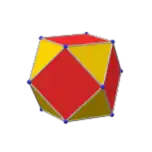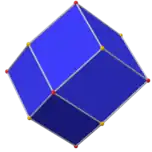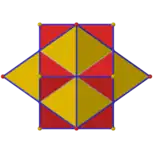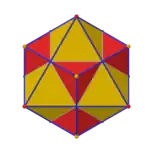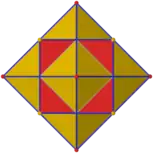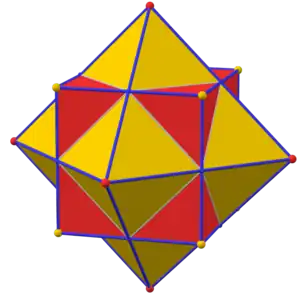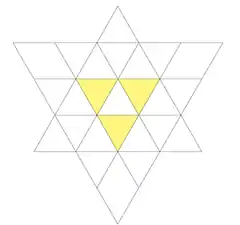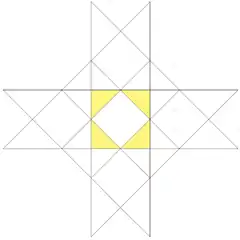Compound of cube and octahedron
The compound of cube and octahedron is a polyhedron which can be seen as either a polyhedral stellation or a compound.
| Compound of cube and octahedron | |
|---|---|
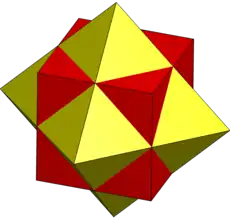 | |
| Type | Compound |
| Coxeter diagram | |
| Stellation core | cuboctahedron |
| Convex hull | Rhombic dodecahedron |
| Index | W43 |
| Polyhedra | 1 octahedron 1 cube |
| Faces | 8 triangles 6 squares |
| Edges | 24 |
| Vertices | 14 |
| Symmetry group | octahedral (Oh) |
Construction
The 14 Cartesian coordinates of the vertices of the compound are.
- 6: (±2, 0, 0), ( 0, ±2, 0), ( 0, 0, ±2)
- 8: ( ±1, ±1, ±1)
As a compound
It can be seen as the compound of an octahedron and a cube. It is one of four compounds constructed from a Platonic solid or Kepler-Poinsot polyhedron and its dual.
It has octahedral symmetry (Oh) and shares the same vertices as a rhombic dodecahedron.
This can be seen as the three-dimensional equivalent of the compound of two squares ({8/2} "octagram"); this series continues on to infinity, with the four-dimensional equivalent being the compound of tesseract and 16-cell.
A cube and its dual octahedron |
The intersection of both solids is the cuboctahedron, and their convex hull is the rhombic dodecahedron. |
The hexagon in the middle is the Petrie polygon of both solids.
As a stellation
It is also the first stellation of the cuboctahedron and given as Wenninger model index 43.
It can be seen as a cuboctahedron with square and triangular pyramids added to each face.
The stellation facets for construction are:
See also
References
- Wenninger, Magnus (1974). Polyhedron Models. Cambridge University Press. ISBN 978-0-521-09859-5.


